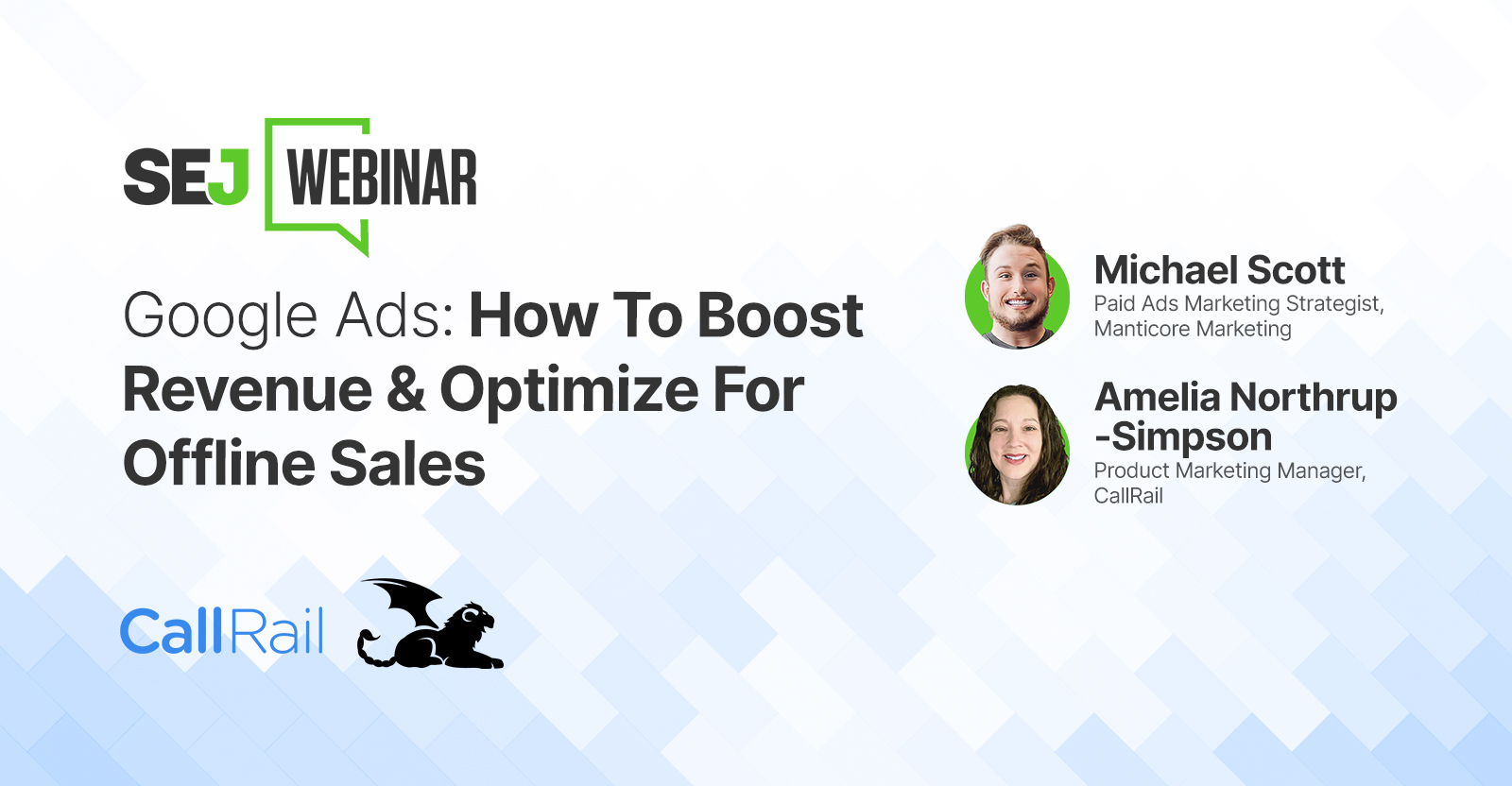Google Ads: How To Boost Revenue & Optimize For Offline Sales via @sejournal, @lorenbaker
Unlock the secret to scaling your Google Ads & optimizing offline conversions! Join industry leaders in our on-demand webinar. Access now! The post Google Ads: How To Boost Revenue & Optimize For Offline Sales appeared first on Search Engine...

Looking for ways to scale your Google Ads account and advance your strategy?
Are you optimizing for offline actions, too, like calls and sales?
On June 21, I moderated a webinar with Michael Scott, Paid Ads Marketing Strategist at Manticore Marketing, and Amelia Northrup-Simpson, Product Marketing Manager at CallRail.
Scott and Simpson showed ways you could use Google Ads and other tracking systems to optimize your offline activity and maximize your ad ROI.
Here’s a summary of the webinar. To access the entire presentation, complete the form.
What Is An Offline Conversion?
Offline conversions involve activities outside online platforms like websites, apps, or software.
These non-digital actions, often tracked in a CRM, mainly consist of sales or closures. By optimizing offline activities, we can concentrate on making sales instead of online conversions.
[Get examples] Instantly access the on-demand webinar →
How To Optimize Google Ads For Offline Sales
Let’s take a step-by-step walkthrough of the process.
What You Need To Get Started
Before you start, there are a few key tools and resources you’ll need to have at your disposal:
Google Ads Account. A way to track Google Click ID (GCLID). Customer Relation Management (CRM) System. Upload automation (Through Zapier).[Find out what a GCLID is] Instantly access the on-demand webinar →
Step 1: Create Your Upload Plan
The first step you need to take is determining how to upload the data, which will be discussed in part 4.
Despite the availability of various methods, using Google Sheets is often the most practical, as it is compatible with different platforms and doesn’t disrupt workflow.
[Get an upload template] Instantly access the on-demand webinar →
Step 2: Track GCLID
You’ll need two implement different GCLID setups: Form tracking and Call tracking.
[Learn what these are, now] Instantly access the on-demand webinar →
Step 3: Use CRM To Import & Export Leads
First, ensure that each data field on any form has a CRM destination.
After importing leads into the CRM, automation should be set up for lead export via an automation tool or possible native CRM integration with Google Sheets.
[Get a demo of what this should look like] Instantly access the on-demand webinar →
The CRM data will be transferred directly to Google via a CRM-Zapier connection or a Google Sheet.
Step 4: Create A Google Ads Conversion
Now, you’ll create the Google Ads conversion, revisiting step one to assess its applicability to your situation.
Click on Tools & Settings. Click on conversions. Do a new conversion action. Click on import. Click on other data sources or CRMs. Track conversions from clicks.[Find out how to import offline conversion on Google] Instantly access the on-demand webinar →
Step 5: Create Your Campaign
You can now make a campaign on Google ads with the Goal of “Offline Conversion.” If you set it as an account goal, it will automatically optimize based on offline conversions!
[Slides] Google Ads: How To Boost Revenue & Optimize For Offline Sales
Here’s the presentation:
Join Us For Our Next Webinar!
Mastering GA4: How To Use The New Google Analytics Like A Pro
Join this webinar to make sure your business has GA4 set up with conversion tracking working, and learn how to utilize the new interface, event data types, and more to keep your campaigns on track.
Image Credits:
Featured Image: Paulo Bobita/Search Engine Journal

 FrankLin
FrankLin 






























.jpeg?trim=0,89,0,88&width=1200&height=800&crop=1200:800)

